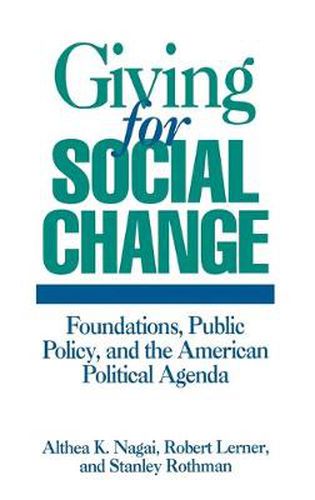Readings Newsletter
Become a Readings Member to make your shopping experience even easier.
Sign in or sign up for free!
You’re not far away from qualifying for FREE standard shipping within Australia
You’ve qualified for FREE standard shipping within Australia
The cart is loading…






This study shows how philanthropic foundations and their leaders help shape the American political agenda. The authors’ central argument is that foundation leaders are members of a key social and political elite in American society. Relying on a survey of such leaders and on an examination of foundation public policy grants, the authors demonstrate that members of the foundation elite are among the most polarized groups in American society.
This study shows how philanthropic foundations and their leaders help shape the American political agenda. The authors’ central argument is that foundation leaders are members of a key social and political elite in American society. Relying on a survey of such leaders and on an examination of foundation public policy grants, the authors demonstrate that members of the foundation elite are among the most polarized groups in American society.
Contrary to popular belief, those who control foundations seek to make American more progressive. Public policy oriented foundations are largely liberal in outlook and make grants primarily to liberal individuals and organizations. The authors examine the dilemmas that the existence of such organizations create for democratic political theory. The discussion is placed in the context of a historical overview of the role of foundations in American society; it will be of great interest to public policy professionals, political scientists, and those who track the direction of the national agenda.
$9.00 standard shipping within Australia
FREE standard shipping within Australia for orders over $100.00
Express & International shipping calculated at checkout
This study shows how philanthropic foundations and their leaders help shape the American political agenda. The authors’ central argument is that foundation leaders are members of a key social and political elite in American society. Relying on a survey of such leaders and on an examination of foundation public policy grants, the authors demonstrate that members of the foundation elite are among the most polarized groups in American society.
This study shows how philanthropic foundations and their leaders help shape the American political agenda. The authors’ central argument is that foundation leaders are members of a key social and political elite in American society. Relying on a survey of such leaders and on an examination of foundation public policy grants, the authors demonstrate that members of the foundation elite are among the most polarized groups in American society.
Contrary to popular belief, those who control foundations seek to make American more progressive. Public policy oriented foundations are largely liberal in outlook and make grants primarily to liberal individuals and organizations. The authors examine the dilemmas that the existence of such organizations create for democratic political theory. The discussion is placed in the context of a historical overview of the role of foundations in American society; it will be of great interest to public policy professionals, political scientists, and those who track the direction of the national agenda.